Introduction to Romanticism
Rejecting the "truths" of logic and mathematics, the Romantics praised instead the powers of the "underside" of the human psyche: imagination, emotion ("feeling" and "heart"), and intuition. Romantic art, then, was characterized by high flights of imagination, not the charming and clever "fancy" or "wit" of the preceding age. For an immediate feel for the difference here, compare Shelley's passionate hysteria to Pope's measured verse, or Beethoven's later symphonies to the music of Hadyn. Romantic writers sought to evoke strong feelings in their readers. They believed that emotions were a more authentic and powerful driver of human experience than reason or intellect. This focus on emotions led to a focus on the inner lives of characters, making them more relatable and accessible to readers. |
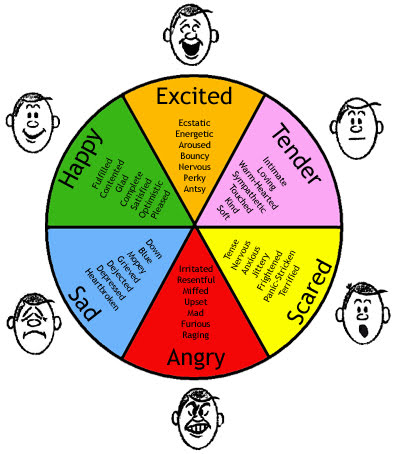
Baton Rouge Counseling's Managing Emotions Chart |
Against the Age of Reason's absolutes of mathematical truth and scientific objectivity, the Romantics also championed an individual's subjective right to discover their own "truths" through imagination, emotion, and intuition. This led to some rebellious—and scandalous—lifestyles among some of its practitioners. (This aspect of Romanticism is evident today in the persona of the rock star.) The Romantics believed in the importance of the individual, seeing them as a unique and creative being, capable of great good or great evil. This focus on the individual led to a more personal and introspective approach to writing, with a greater emphasis on the poet’s own experiences and emotions. The Romantics, more than anyone, are responsible for our notion of the artist as someone special, a "breed apart" (sometimes bordering on insane), along with the idea that the creative act involves an almost magical, spontaneous, inspired leap of imagination. |
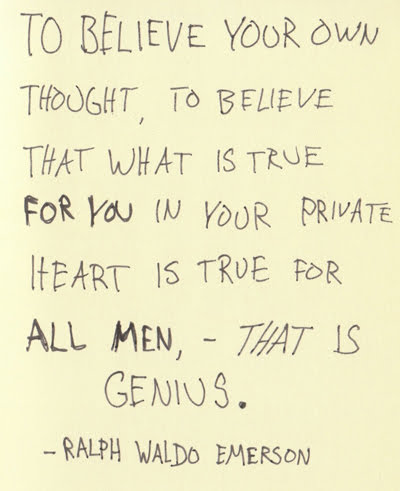
Ralph Waldo Emerson sums it all up |
The Romantic emphasis on emotion and intuition led them to champion those people they considered to be more emotional, intuitive, unconscious, and closer to humankind's psychic roots. These were the "primitives," women, children, and simple country folk, all of whom are not infected with the "disease" or rationality. And yes, this understanding is just what it looks like; both racist and sexist. |
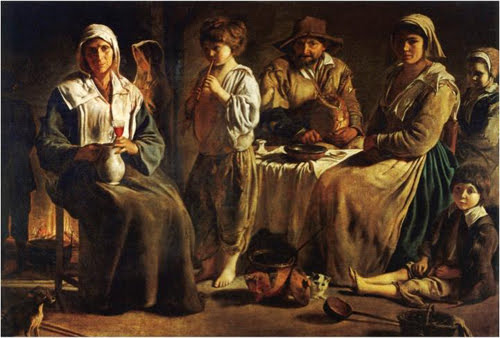
"A Peasant Family", by Louis le Nain |
Related to their attraction to the primitive (and to their reaction against the social constraints of the 18th century) was a comparable attraction to exotic settings (e.g., Coleridge's "Kubla Khan") and medieval settings (e.g., Hugo's The Hunchback of Notre Dame). There is distance from the European present (the veritable seat of rationality in the world, as the Romantics saw it) in both space and time. Again, the motivation was the same: both are places or times before or not yet infected by the disease of Reason. There was a comparable interest by the Romantics in folk literature, especially of their native lands: note Wordsworth's and Coleridge's revival of the ballad stanza, for example. (This new appreciation for folk literature is connected with another Romantic manifestation, nationalism [see below].) |
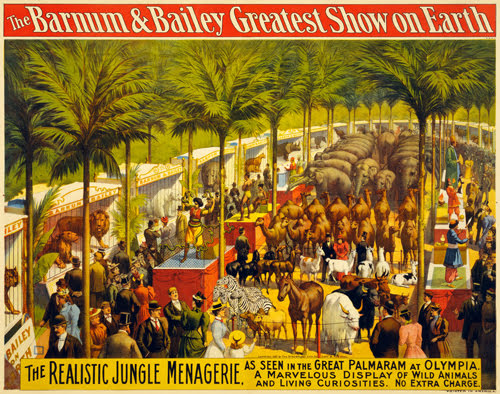
The Exotic On Display |
For many Romantics, just being away from the city was "exotic" enough, and Wordsworth, one of the "founders" of English Romanticism, promoted another Romantic revolution: the change in literary subject matter from urban-centered to nature- or rural-oriented. More than just lovers of birds and flowers, several Romantics created a "Religion of Nature," projecting upon nature per se a mystical monism, or pantheism, that was itself the result of their intuitive/emotional approach to reality. The concept of the sublime is closely tied to the Romantic interest in nature. The Romantics saw beauty in the awe-inspiring, the terrifying, and the humbling aspects of nature. The sublime is a way of describing the experience of being overwhelmed by nature’s power and majesty; we can see it in the stormy seas in Byron’s "Don Juan" or in the mountain landscapes in Wordsworth’s "The Prelude." Many contemporary scientific studies have found that spending time in nature is beneficial for our health. In one study, walking in trees lowered people’s blood pressure, cortisol levels, pulse rates, and sympathetic nervous system activity (related to stress), while increasing their parasympathetic nervous system activity (related to relaxation). Another study found that people living in proximity to trees had better “amygdala integrity” — meaning, a brain structure better able to handle stressors. |
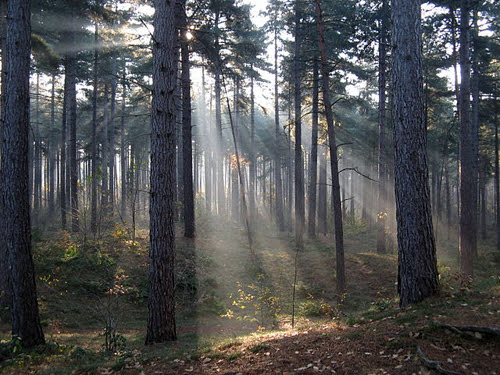
While with an eye made quiet by the power Of harmony, and the deep power of joy, We see into the life of things. |
The Romantic focus on the natural world led inevitably to an exploration of the supernatural. Romantic literature in general often explores the unknown and the unexplained. This interest in the mysterious and the uncanny is evident in works like Mary Shelley’s Frankenstein or Edgar Allan Poe’s "The Raven." The Romantics were fascinated by the world beyond the human experience, and they often incorporated elements of the occult, the esoteric, and the fantastical into their writing. Common elements in this vein would be animals that are portents of doom, attempts to commune with the dead, or the presence of ghosts or spirits bound to a particular place. "Dark Romanticism" takes these supernatural elements one step further, focusing on the irrational, the demonic and the grotesque. It is often conflated with Gothic fiction, but it is more properly considered as the shadow side of the Romantic movement. Dark Romanticism focuses on human fallibility, self-destruction, judgement, punishment, as well as the psychological effects of guilt and sin. |

La Belle Dame Sans Merci Henry Meynell Rheam, 1901 |
The Romantics also made revolutionary changes in the form of art itself. In literature, for instance, Pope's "tick-tock-to-death" heroic couplets were replaced by great experimentation in stanza forms among the English Romantics. Wordsworth wrote blank verse, and ballad stanzas, and Spenserian stanzas, and Italian sonnets, and irregular odes, and many other forms. In America, Whitman took it one step further, throwing out meter altogether and writing free verse. Even poetic diction was revolutionized, in accord with their championing of democracy (see below) and the simple folk: Wordsworth and Coleridge, in their "Preface" to Lyrical Ballads (1798), called for poetry in the language of the "common man," and Whitman occasionally used words whose coarseness was shocking to 19th-century purveyors of poetry. Another link to our day should be evident here: modern writers now use four-letter words with great abandon. |
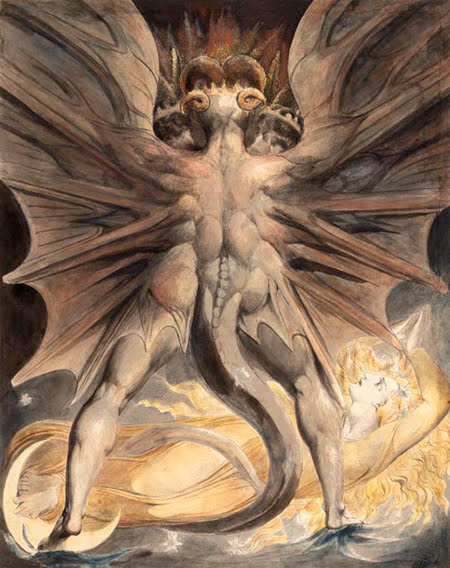
Blake's "Great Red Dragon" |
The Romantics important not just socially, but politically as well. Their understanding of the world laid the underpinnings for the French Revolution, with its clamor for democracy and individual rights, and, above all, its politics of "emotion." (For this reason, Bertrand Russell would later fault Romanticism for the rise of Hitler.) For better or worse, at least some of the credit or blame for the rampant nationalism of the last two centuries must be laid at the doorstep of the Romantic movement. From the hippies of the 1960s, and their determination to "let it all hang out" and "let your freak flag fly," to the "Back to Nature" movement, from the whole New Age movement to the current fascination with self-help and self-development, all of these are latter-day manifestations of the Romantic Revolution, the motley descendents of Goethe and Wordsworth.Ever since the French Revolution, those of a Romantic bent have predicted and/or yearned for an apocalyptic change in humankind, be it political, religious, or psychological. This messianism, too, continues to this day, as many wait for the time when a "new day will dawn." |
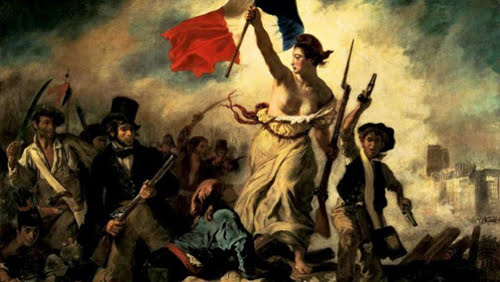
Liberty Leading The People by Eugène Delacroix |
There's a downside to using your feelings to determine how you will live your life: you can end up with too much emotion. The Romantics sometimes gave in to one or more of these three great excesses:
|
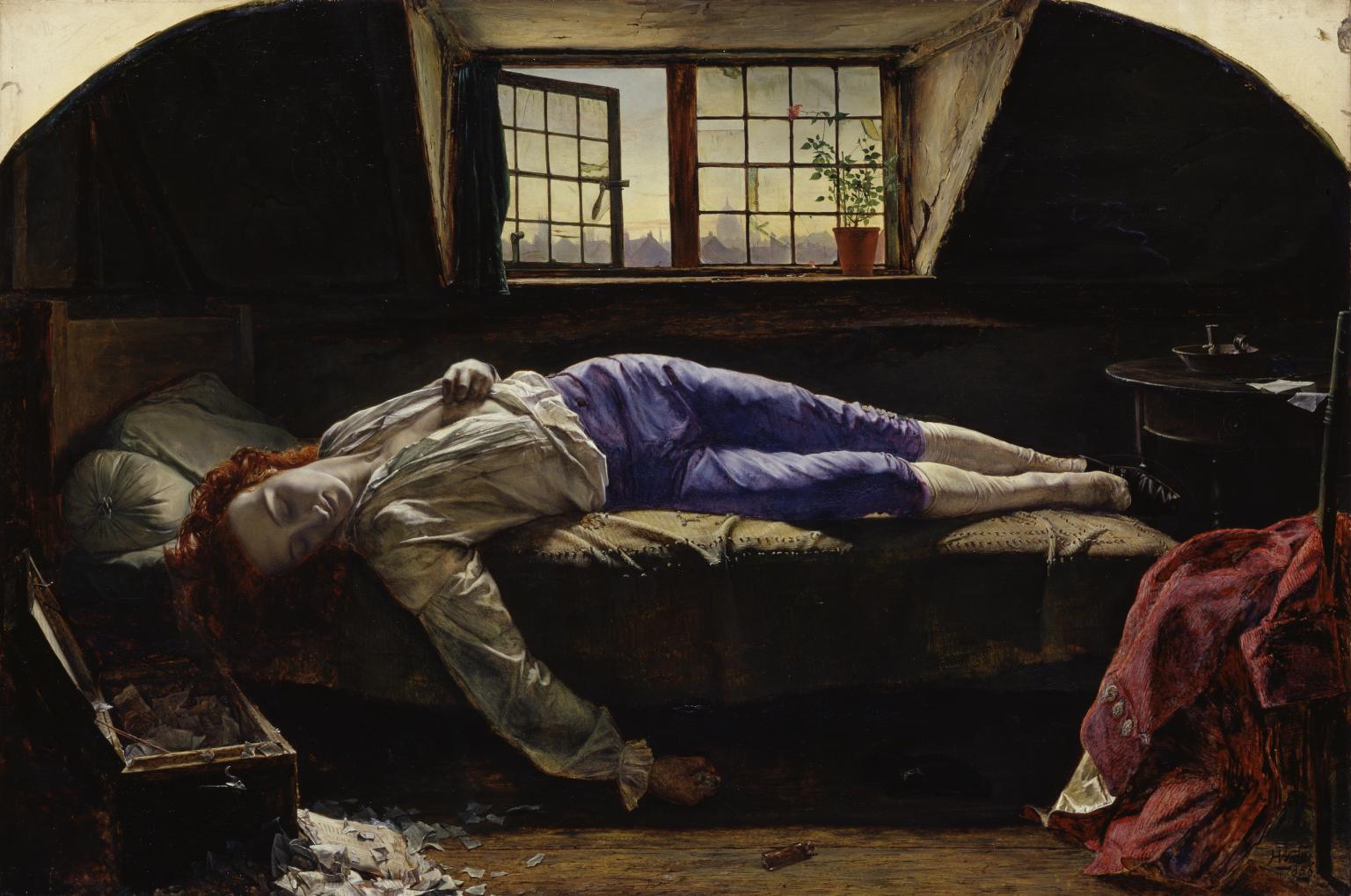
Chatterton by Henry Wallace |